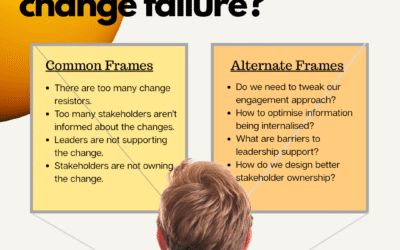Is change management just a job or a career? When you clock in and clock out everyday do you ever wonder what is the purpose of all this work? Yes, your natural response could be, well, managing change helps improve employee work experience and we help company land initiatives. We help maximise initiative benefits. Is this all? And are these the only ultimate outcomes?
For those of us who have made change management a career, we often roll out eyes across initiatives as we see common trends and occurrences across initiatives. What would have been highly stressful or dramatic is just seen as ‘yet again’ more of the same. You know what I mean …
- Sponsors who only show up for announcements and ghost the project team the rest of the time
- Corporate communications wrestle you to the ground by taking out factual information about the initiative that are critical
- You send out a series of initiative communications and the impacted teams rarely read them
- Some of your stakeholders nod and agree furiously in project meetings and do nothing afterwards, despite repeated engagement and consultations
- Thanks for corporate-wide budget cuts, your project is now sliced into bare bones, and all the work required to drive behaviour change evaporate into thin air, to be replaced by a pure system implementation
Don’t get me wrong. There is definitely a lot of organisational benefits in managing change. There are definitely ample studies that draw attention to how, without successful change efforts, initiatives are doomed for failure. We definitely play a key role in achieving those hefty millions in benefits that are targeted. Also, let’s not forget that most of us are in this because we care about people. We truly believe that creating a good experience for people is the essence of what drives successful change.
The big questions is – what is your purpose and the meaning you are striving for when you work in change management? Beyond the cheque that pays the bills, why do we work hard to improve how change is managed? What is our north star? What truly motivates through thick and thin, through obstacles that stakeholders put along the way?

This is a personal question and not always an easy one to answer. There are some who are happy to go to work, get paid, ignore the BS within the corporate environment, just to feed their family and pay the mortgage. Others may have stumbled into change management and find it interesting work. However, to really strive in leading change, year after year, initiative after initiative, there would need to be some kind of burning flame inside you that keeps pushing you forward.
Exploring your own motivation in driving change not only helps you to understand your own behaviour and the source of your energy, it also helps you be clear about what you really care about. Clarity about your passion helps you to know what to reach for next time you are feeling down about how the project is going, or none of your change tactics are panning out.
For me, the meaning of managing change is only realised after experiencing a series of bad changes. Let me share more. I’ve worked for organisations where I have seen how hurtful and how traumatic bad changes have been for employees. A typical context is organisational restructuring. These are just a few examples what could happen ….
- Employees are marched out by security after having lost their jobs on the day of the announcement, in case they retaliate and ‘steal’ company secrets, in public display for everyone to see
- Leaders lie through their teeth about what is going to happen to the restructure in order to keep the workers productive, and eventually everyone realises it’s all been a series of lies and fabrications
- Consultants are brought in to do the analysis and leaders basically reference what the message is from consultants, without interpreting what this really means for their people. Employees with years of tenure who have significant insight into how to improve business outcomes are ignored
- In order to gain better roles and responsibilities managers backstab each other and even team members to jostle their way to favourite positions in the new org chart
For the individuals involved it could be such traumatic experiences that they may be scarred by the experience. Counselling may be required and organisational stress levels may be through the roof. It is not just those individual employees, but their families and friends could also be impacted like ripples in a pond.
Even if you don’t focus on the most dramatic of changes, a series of smaller badly run changes can still impact employees, their belief in the company, their trust in management, their work life health as well as overall health. Multiple smaller changes can add up.
So for me, the real meaning behind managing and leading change is about all those individuals that could be impacted, whether it be employees, customers or partners. Each is a person with a set of circumstances. They may be dealing with other stressors in their family or friendship circles already, or that they may be particularly vulnerable. This is particularly the case in our virtual working world.
Every person deserves to lead a happy, healthy work life. And change is such an important and memorable part of working life that every life you touch is a touch of dialling up the happiness/health level. It may not be the jumping up and clicking heels type of happiness. It would be managing risks so that negative experiences are avoided or minimised. Now imagine a long list of multiple changes all effective managed. Such is the power of managing change. We touch working lives in profound ways.
This is why at The Change Compass our vision is to improve the experience of people during change. “People’s work lives shape who we are and bad change experiences can be traumatic. With great change experiences, we can change the world”.
Now, isn’t this something to get motivated about through thick and thin?
What is YOUR meaning in managing change? How have your experiences shaped your approach and belief in managing change? How do you keep going day in and day out especially when times are tough?
To read more about designing change visit our ‘Designing Change’ section.






